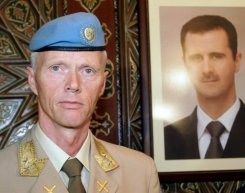
A veteran peacekeeper urged all sides to "stop the violence" as he flew in to Syria to lead a UN observer force for a more than two-week-old ceasefire that has failed to stop bloodshed.
"To achieve the success of the Kofi Annan plan, I call on all sides to stop violence and help us continue the cessation of armed violence," Major General Robert Mood said, referring to the international envoy on the crisis.
"We will work for the full implementation of the six-point Annan plan which the Syrian government agreed to," he told reporters in Damascus.
"To achieve this, we now have 30 monitors on the ground, and in the coming days we will double this figure," he said, adding that the number would "rapidly" increase to 300.
On the night of his arrival, the Syrian Central Bank came under rocket propelled grenade attack, state television reported on Monday, blaming an "armed terrorist group."
"An armed terrorist group staged an RPG attack on the Central Bank of Syria on Sabaa Bahrat Square in Damascus," the television reported. "Only material damage was caused."
It said three armed men in a vehicle carried out the attack at around 1:00 am Sunday before quickly making their escape.
Annan's plan calls for a commitment to stop all armed violence, a daily two-hour humanitarian ceasefire, media access to all areas affected by the fighting, an inclusive Syrian-led political process, a right to demonstrate, and release of arbitrarily detained people.
Mood, a 54-year-old Norwegian who negotiated the conditions for the deployment of the advance team, was head of the UN Truce Supervision Organization, which monitors Middle East truces, from 2009 until 2011.
He stressed the monitors need the cooperation of all parties to achieve their mission: "The observers can't solve all problems in and of themselves… All sides must stop violence and give the process a chance."
As he landed, at least 29 more people were killed nationwide on Sunday, the Syrian Observatory for Human Rights said. It said eight soldiers and eight civilians died, among them two shot dead by snipers in the central city of Homs.
A spokesman for the observer mission said the advance party had set up base in the major trouble spots at the center of the bloodshed that the United Nations estimates has cost more than 9,000 lives since March 2011.
A putative truce, which technically came into effect on April 12, has taken a daily battering.
Thirty-two people were killed on Saturday, including 10 rebel fighters opposed to the regime of President Bashar al-Assad in the Damascus region, the Syrian Observatory said.
And in what was believed to be the first case of Westerners going missing in the violence-swept country, Budapest said that two Hungarians had been kidnapped.
Peter Szijjarto, a spokesman for Hungary's Prime Minister Viktor Orban, told the country's state news agency MTI on Sunday that the two were alive.
"The foreign ministry, the Hungarian consulate in Damascus and the TEK (Hungary's anti-terrorism center) are working together day and night to ensure that the kidnapping will be resolved peacefully as soon as possible," he said.
The Hungarians were snatched on Saturday from a company's offices in southeast Syria, the spokesman said.
With the bloodshed adding to the death toll each day since the ceasefire, Red Cross chief Jakob Kellenberger said Annan's peace plan was "in danger," in an interview with Swiss weekly Der Sonntag.
"I place great hope in the six-point plan of Kofi Annan, which includes the UN mission tasked with monitoring the ceasefire," Kellenberger told the paper. "Unfortunately, I am also very aware that the plan is in danger."
Across the border in Lebanon, intelligence officers on Sunday were questioning the crew of a Sierra Leone-flagged vessel originating in Libya over allegations it was carrying arms to Syrian rebels.
The interception of the ship by Lebanon — currently governed by a largely pro-Syrian coalition — gave grist to Russian opposition to the tough Western and Arab line taken against its long-time Middle East ally.
Lebanon said it had intercepted three containers of heavy machineguns, artillery shells, rockets, rocket launchers and other explosives destined for rebel forces.
State newspapers Tishrin and Ath-Thawra, meanwhile, charged that Al-Qaeda was operating in Syria and carrying out its trademark suicide car bombings with the support of Washington and some Arab countries.
In the latest bomb attack in Damascus, at least 11 people were killed and 28 wounded on Friday, official media said.
An Islamist group calling itself Al-Nusra Front claimed responsibility for the attack, the SITE Monitoring Service said on Sunday. The group said the bomber, whom it named as Abu Omar al-Shami, had targeted the security forces.
The US-based SITE, which tracks jihadi websites, said the group posted its claim on the Shumukh al-Islam site which is generally used by Al-Qaeda.
